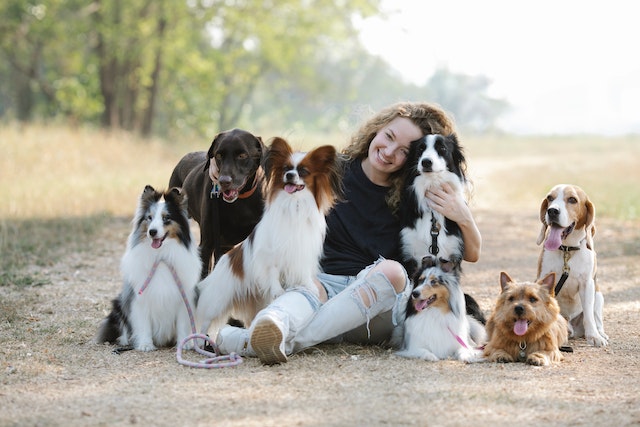By Linda Hamilton
What To Know Before You Get A Dog

Life with a dog is so rewarding and fun! They are our best friends and our best companions. They can help us through tough times and make our good times more enjoyable. But taking care of a dog gives us a lot of responsibility and requires commitment. Also, it is expensive and time-consuming. If you are contemplating getting a dog and have no experience, you are in the right place. In this article, I will tell you what you need to know before your new family member arrives.

1. Commitment to your furry friend
You must realize that owning a canine gives you a lot of responsibility. Owning and taking care of a dog means, that you give him your time, sufficient nutrition, exercise and activities, training, and looking after his health by taking him to the vet.
Getting a dog is a long-term thing. Some dogs live up to the age of 15 or even 18. Make sure to commit to taking care of him throughout his life. So think ahead. What are your plans in life? Will a dog fit into your life in the future too?
A dog needs your time and attention, especially when he is a puppy.
For example, a puppy needs company and someone to do activities with. He also needs to go outside every few hours. Are you able to make that happen?
Adults need to go out too. Are you able to provide him with this obvious need?
2. What kind of dog suits best for you and your family?
Finding a furry companion that fits your lifestyle is really important. You shouldn’t pick a dog on a whim just because he is cute.
Start by figuring out which breed suits best based on their personality and how much exercise they need. Take a look at your lifestyle. Are you active and want an active companion? Then bulldogs or pugs are not the right breeds for you. If you are not active and live in the downtown area, then a Border Collie probably isn’t the right breed for you.
Get familiar with every breed there is so you can get an idea of what their personality and activity levels are like. This helps you with choosing the best one for you.
Considering the size of your new buddy is also important. If you have small kids in your family, a big dog might accidentally knock them over, so a small buddy might suit your needs better. Also, smaller dogs need less exercise and food, so they can be a little bit cheaper to take care of.
Do you want a puppy, or would an adult dog be the wisest decision? Even though puppies are adorable, an older one might suit your lifestyle better because you don’t have to train them as much.
Some puppers might have had to change owners without it being their fault, so they need a new good home. An adult dog might have had a challenging start to his life, so it needs adjustments and time to build up a trustful relationship.
The most important thing is to ensure the puppy is healthy and he can adapt to his new home.
Training your dog is necessary.
Some breeds are more challenging to train than others. When considering whether you want to train your dog or get a trained one, I suggest you do it yourself. The reason is that when you train him, you build an unbreakable bond between you two.
You can also get a trained dog, but you still need to put in the effort to keep up the training. Also, if you get a dog that has been trained by someone else it might cost more.
To have a well-behaving companion, you need to have frequent training sessions. Many short training sessions daily are the best and most effective way to teach your dog the basic commands.
The most crucial time of the dog’s life for learning is when they are puppies. That is when they learn the easiest, so that is the time you should put a lot of effort into the training.
4. Can you afford it?
Dogs are not cheap pets. So think further. Are you able to afford all the expenses?
When you get your dog, it is not the only purchase you have to make.
Here are some of the other expenditures:
– Quality food and treats
– Annual vet visits, vaccinations, and medications
– Supplies: toys, collar, leash, bed, ID tags, etc
– Grooming supplies (or if you plan on not doing it yourself, then appointments)
– Flea, tick, and heartworm preventatives
– Insurances
And obviously, the list goes on.
Life happens, and sometimes you need to have money saved up in case he gets into an accident or something else occurs.
5. Environment
Is the environment safe?
You need to make sure your house is dog-proofed. Your home and yard should have nothing that could harm your dog, so check everything before bringing him there.
Check that the floors are free from stuff that he could swallow. Put things that could be harmful to him out of his reach.
If your floor is slippery, consider putting on mats. Make sure he isn’t able to escape from the yard and make sure that there are shadow places for him.
Put a fence to places where the dog is not allowed to go or is not safe for him. Before the dog arrives, there should be bowls, toys, and an area for potty training.
Also, you should have food ready for him.
If you live in a house with a big yard, consider putting a fence in the yard. Then you can let him go out more often.
Overall the best way to keep him safe is to keep an eye on him.
6. Exercise and activities
A dog needs daily exercise and active playtime.
Are you able to take your dog out for a walk every day?
Every dog needs movement, or they will get bored and frustrated. Regular daily walks and other activities help the dog ease out extra energy, helping them to be calm at home, and it is easier for them to be alone for some time.
Can you give him things to do while he does not have your attention?
Hand him a bone to nibble on and eat, but never leave him alone with it. You can also buy puzzle toys to keep him busy. It also makes his mind sharp and avoids boredom.
And so does playing! Playing is a great stimulus activity for a dog’s brain, so make sure you can play with him at least once a day.
7. Care-taking
Know your dog’s needs.
It’s your responsibility to give your dog healthy, balanced, and nutritious food and occasional treats.
And also making sure there is always fresh drinking water available.
Caring for your dog also requires weekly nail clipping and coat care. Whether your dog’s coat is short or long, regular coat care is necessary for his health and appearance.
If you aren’t able or don’t know how to take care of it, you can always turn to a professional trimmer.
8. Socializing
Be aware that you need to take care of his mental health too.
Apart from daily exercise and playing, dogs also need socializing and interactions with humans and animals.
Dogs, especially puppies, need to get used to other dogs, humans, cars, and the outside world. It is also necessary for your older dog to get used to these things if they are unsure or they have behavior problems.
9. Travelling
Nowadays, there are more travel destinations out there that are dog-friendly. So if possible, take your dog with you when you go traveling.
However, If you have to leave your dog at home, someone has to take care of him while you are away. You can ask help from your relatives, friends, or neighbors, or you can hire a dog sitter.
Whatever option you choose, make sure your dog can be without you.
But you have to realize when you get a dog, you can’t longer be as spontaneous as you probably used to be.
Do research
Always be down to read and learn more.
There are so many places you can get new information.
For you, it’s a companion and part of your life, but for him, you are his whole world.
Be honest with yourself. You shouldn’t get a dog if you aren’t able to provide him with his basic needs.
Extra tip
A great way to test if you can take care of a dog is to offer to take care of your friends’ or relatives’ dogs for a few days.
